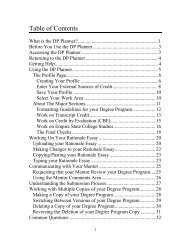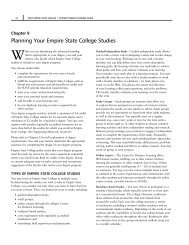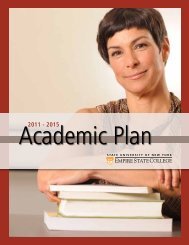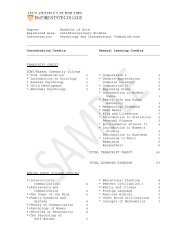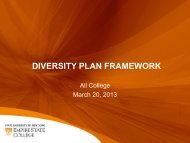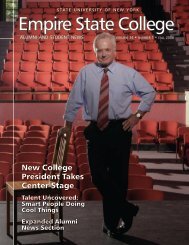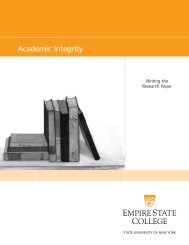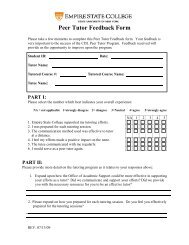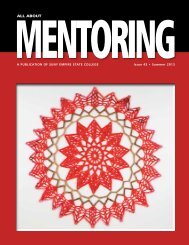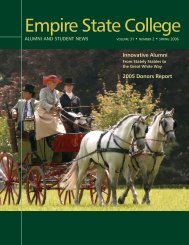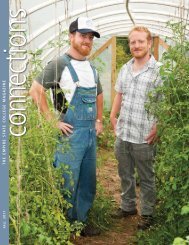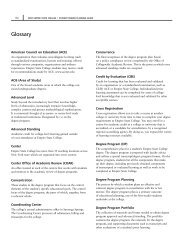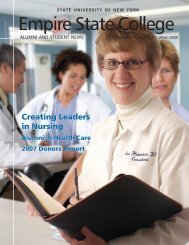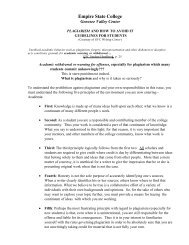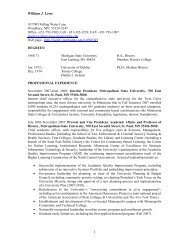All About Mentoring Spring 2011 - SUNY Empire State College
All About Mentoring Spring 2011 - SUNY Empire State College
All About Mentoring Spring 2011 - SUNY Empire State College
You also want an ePaper? Increase the reach of your titles
YUMPU automatically turns print PDFs into web optimized ePapers that Google loves.
26<br />
“So They Will Honor You as a Human Being”:<br />
Indigenous Knowledge and the Practice<br />
of <strong>Mentoring</strong><br />
Jeffrey P. Lambe, Long Island Center<br />
During the late 1980s and early<br />
1990s, I volunteered for a<br />
nonprofit environmental education<br />
organization when the landscaping season<br />
ended. We had contracts with the New<br />
Jersey Division of Corrections and Division<br />
of Family, Youth Services (DYFS). This is<br />
when I met Tekaronianeken Jake Swamp<br />
and Wanbli Nata’u Javen Tony Tenfingers,<br />
onkwehonwe (original or real human<br />
beings) who embodied two of the great<br />
cultural traditions of Turtle Island (North<br />
America), the Kanyen’keha (Mohawk, the<br />
People of the Place of Chert or Quartz) and<br />
the Oglala Lakota. In subsequent years, I<br />
volunteered with the Tree of Peace Society,<br />
a cultural and environmental education<br />
organization that Jake founded. At one<br />
point, Jake commented: “Why don’t you get<br />
that piece of paper so they will honor you<br />
as a human being” I have been reflecting<br />
on the meaning of this suggestion for a<br />
long time. Needless to say, I got that (which<br />
turned into those) piece(s) of paper. In the<br />
following essay, I will describe some of<br />
the unique aspects of mentoring and other<br />
insights that I experienced with these two<br />
extraordinary people – insights that have<br />
influenced the way I approach mentoring<br />
students at <strong>Empire</strong> <strong>State</strong> <strong>College</strong>. It may be<br />
unreasonable to suggest that those outside of<br />
an indigenous culture adopt an indigenous<br />
perspective to mentoring and learning.<br />
However, attentiveness to a different cultural<br />
perspective can prove enriching and can<br />
enhance the work that we do.<br />
The natural world is the model for the<br />
type of mentoring and learning that I<br />
experience. One way to think about<br />
indigenous mentoring and learning is the<br />
process of “coming to know” through a<br />
reciprocal relationship and reflective process<br />
between mentor and mentee. As I will<br />
describe below, this pedagogy is grounded<br />
in a sense of respect for individuality,<br />
cultivation and obligation. The continuing<br />
unfolding of the renewable quality that is<br />
mirrored in the natural world is innate.<br />
Although the individual beings and process<br />
that exist in nature are distinct, they are<br />
interconnected. The natural world is<br />
based on both individual integrity and<br />
contribution in conjunction with others.<br />
This ongoing interconnection facilitates<br />
the renewable spark of life’s continuance.<br />
This is the model for many expressions of<br />
indigenous cultures. For example, during<br />
the Haudenosaunee (Iroquois Confederacy,<br />
Those Who Build the Longhouse) naming<br />
ceremony, the community is reminded about<br />
the importance of observing children as they<br />
grow: simply watch them. Ideally, there is<br />
an obligation to nurture and cultivate the<br />
unique attributes that the child will certainly<br />
express in the coming years. In turn, these<br />
qualities enrich the community and create a<br />
healthy world for future generations.<br />
Both Jake and Tony shared traditional<br />
narratives and personal stories when<br />
they worked in counseling and education<br />
environments. Cultural narratives<br />
intersecting with personal experiences in a<br />
reflective manner is one characterization of<br />
traditional teaching and learning. In a sense,<br />
traditional narratives hold the culmination<br />
of knowledge of a people. These are often<br />
expressed in figurative language and<br />
represent different levels of experience and<br />
knowledge. They are meant to extend to and<br />
guide those living today, as well as future<br />
generations. In essence, such narratives are<br />
a cultural framework that guides people as<br />
they come to being or become real human<br />
beings. The narratives, along with the help<br />
of elders, knowledge holders, and others<br />
helps us embrace the joys and challenges<br />
that we meet along the way. There can<br />
be many layers of meaning – some that<br />
are culture specific, and others that speak<br />
to the entire human experience. The<br />
Jeffrey Lambe<br />
nature of traditional narratives allows for<br />
disparate, even contradictory, truths to arise<br />
simultaneously. It is up to the listener to seek<br />
her or his own understanding by drawing<br />
on personal inferences. In this sense, truth<br />
and validity are determined in terms of a<br />
resonance within one’s experience and being.<br />
I am continually intrigued, challenged and<br />
inspired by the depth of knowledge that is<br />
grounded in – and stems from – expressions<br />
of indigenous knowledge. Even at a young<br />
age, I felt that although the knowledge base<br />
that I was experiencing was very different,<br />
in terms of depth and complexity, it was<br />
akin to anything that was being taught in<br />
a college or university. This was further<br />
validated by the fact that we were regularly<br />
solicited to incorporate the Tree of Peace<br />
Society’s cultural programs with community<br />
service learning components of colleges and<br />
universities.<br />
While working with the state of New<br />
Jersey, I found that the types of learning<br />
environments created by both Jake and<br />
Tony were designed so that all who<br />
suny empire state college • all about mentoring • issue 39 • spring <strong>2011</strong>



